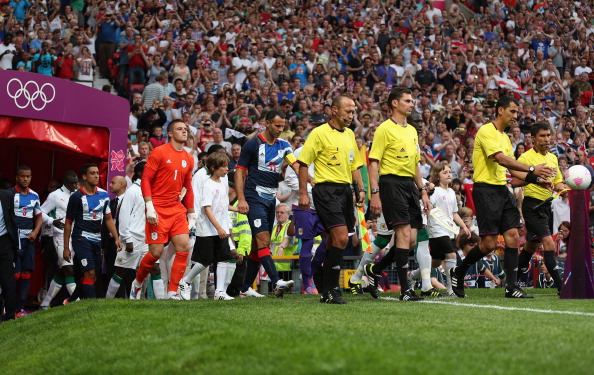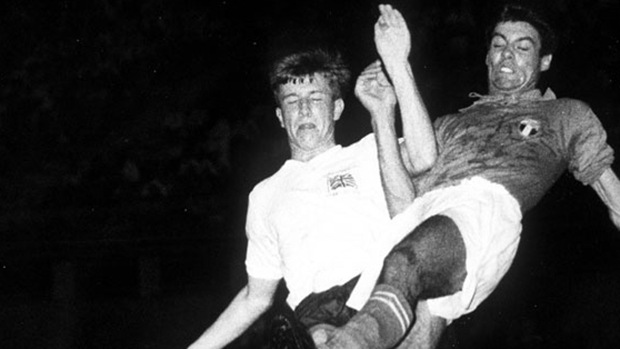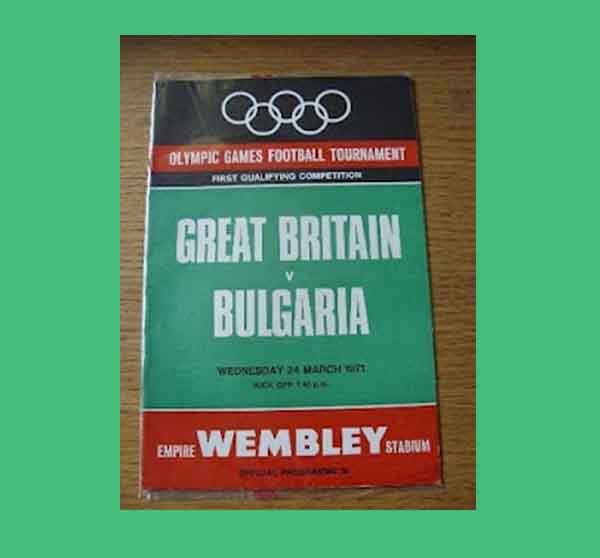When Ryan Giggs (pictured below) led the Great Britain team out against Senegal at Old Trafford yesterday, it was their first competitive Olympic match for 41 years.
In those days, the game in England was still divided between professionals and amateurs and Great Britain were drawn to play Bulgaria in their quest to reach the Olympic Games in Munich.
Charles Hughes, a coach at the Football Association (FA) and the manager of the England amateur team was put in charge.
“Charlie used to push us so hard that if you pulled out of a tackle in training he would not have picked you. Training was so hard,” said Hendon’s Peter Deadman, a squad member for both matches.
The first leg was to be played at Wembley in March 1971.
“The choice of ground would lead to a bigger attendance and a better display by the British team,” said the man from the FA Alan O’Dell.
But only days before the match, fewer than 300 tickets had been sold. Eventually, 3,000 turned up, but even so the crowd looked lost on the vast terraces.
“When we played at Wembley, the Bulgarians guessed something was up when they came out in front of only a few thousand, they expected there to be 100,000,” said John Delaney of Wycombe Wanderers.

“Because most of us were from the Isthmian league, and we were the England amateur side as well – there was no backbiting,” said Delaney.
Because he lived close to the training venue, Delaney received expenses of 50 pence for playing for Britain.
“To get that shirt in the late sixties and early seventies must have cost me £100 ($156/€128),” said Delaney.
“We were under strict instructions about our behaviour and expenses – we were only allowed second class carriage,” said Deadman.
Against the odds, the British team pulled out one of their finest performances to win 1-0 (scene from match pictured below). Joe Adams of Sough Town scored the goal.

“Last night’s match gave our current squad chance to prove themselves the best to represent Britain since the Rome Games in 1960,” wrote former Great Britain team manager Norman Creek.
“The Bulgarians knew that the Wembley score did not really matter because they were going to pull their big guns out in Sofia. They were a team of hardened professionals,” said Delaney.
By the time of the return match in Sofia it was Cup final week back home. All the domestic attention was focused on Arsenal. They had just clinched the Championship. Victory over Liverpool at Wembley in the FA Cup final would make sure of the double.
The British squad flew to Sofia with precious little fanfare and no support. In fact, the only people who turned up to watch them play were a handful of Embassy staff.

The atmosphere in Sofia in front of a huge crowd was intimidating as Great Britain walked out in red shirts.
“I will never forget there was a sign above the goal which said ‘Goodbye Sweet Dreams’,” said Delaney. Any lingering thoughts the British might have had of an Olympic spot were soon dashed as Bulgaria piled on the pressure and scored five on the night. Their dominance was so great that when fellow Wycombe Wanderers defender Ted Powell suggested that the defence push up on a rare British sortie into the Bulgarian half, Delaney replied: “You push up if you want to, I will stay here because they will be back in a minute.”
That proved to be the very last British football team until 2012. Changes in the structure of the FA in England abolished the distinction between amateur and professional and at a stroke rendered the British player ineligible for the Games. At the time, teams were supposed to be strictly amateur, but many nations fielded players from the top flight. The Polish team that won gold in Munich contained the core of the side that knocked England out of the 1974 World Cup and finished third in the tournament themselves.
Philip Barker, one of the world’s most renowned sports historians, is the author of The History of the Olympic Torch, published by Amberley recently. To order a copy click here.

